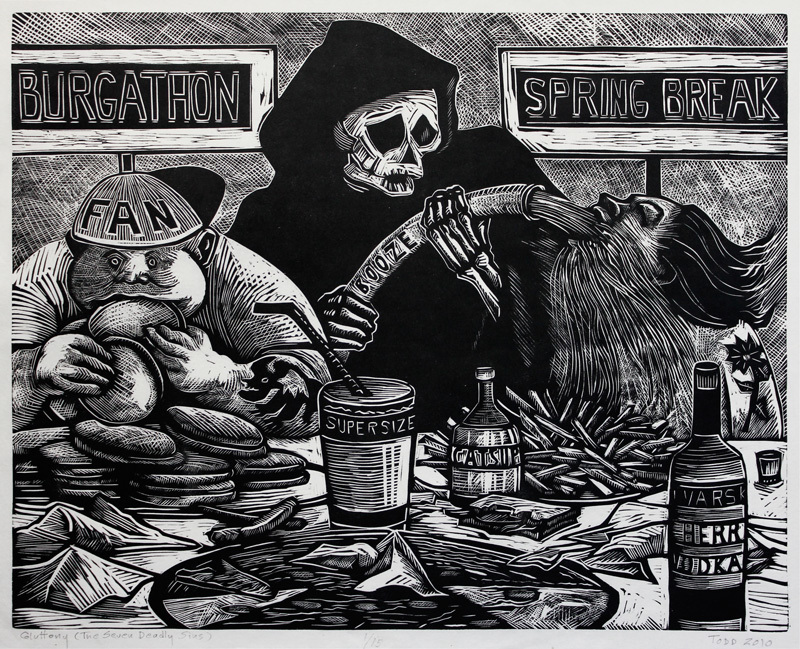Loaded question alert: Is gluttony worse than murder?
We live in a world where gluttony is celebrated. It’s dressed up as indulgence, self-care, and personal freedom—a harmless quirk of modern life. Meanwhile, murder is universally condemned, a line no moral or legal system allows to be crossed. Yet gluttony, in its many forms, might be far more destructive than we care to admit.
This is not to minimize the severity of murder, a heinous act that takes life instantly. Instead, this argument asks us to examine the slow, insidious death caused by gluttony: the erosion of health, community, and the environment, driven by a culture addicted to excess and instant gratification.
What if gluttony, through its far-reaching consequences, is more corrosive to society than we’ve ever dared to consider? Let’s unravel this provocative idea by exploring gluttony in all its dimensions—not just as overeating, but as a lifestyle of self-pleasing excess.
Gluttony: A Forgotten Sin with Modern Relevance
“Gluttony denotes, not any desire of eating and drinking, but an inordinate desire… leaving the order of reason, wherein the good of moral virtue consists.” — Thomas Aquinas, Summa Theologiae

First, let’s ground this discussion in the context of sin. Sin, generally speaking, is an act that violates moral, divine, or societal laws. Murder, undeniably, is a grave sin; it terminates life, directly affects individuals, families, and communities, and leaves an indelible scar on the social fabric. But gluttony? It’s listed among the seven deadly sins alongside pride, lust, envy, anger, sloth, and greed, yet it’s often laughed off as mere excess or indulgence.
At its core, gluttony is the inordinate desire to consume more than one needs. Historically, it was counted among the Seven Deadly Sins, alongside pride, greed, envy, wrath, lust, and sloth. Yet today, it’s brushed off as harmless—a punchline in sitcoms, an aesthetic of indulgence promoted on Instagram.
But gluttony isn’t confined to food. It’s a mindset, a behavior, and a way of life that prioritizes self-satisfaction over self-discipline, and pleasure over purpose. In our dopamine-driven society, gluttony shows up everywhere:
- Food: The obesity epidemic is only one manifestation of our tendency to overconsume.
- Material possessions: Our closets overflow with fast fashion, our homes with gadgets we rarely use.
- Entertainment: Hours vanish into the black hole of binge-watching, doom-scrolling, and gaming.
- Emotional dependency: Seeking constant validation, attention, or drama is another form of overindulgence.
Gluttony is about feeding the flesh—whether it’s the belly, the ego, or the senses. And like any addiction, its consequences ripple outward.
The Expanding Reach of Gluttony
Unlike murder, which ends a life in an instant, gluttony erodes life slowly, systemically, and on a massive scale. Its impact is not just personal but societal, even planetary.
1. Gluttony’s Toll on Health
Gluttony is fueling a global health crisis:
- Obesity and chronic diseases: According to the World Health Organization’s 2022 data, more than 2.5 billion adults worldwide are overweight, and obesity is linked to heart disease, type 2 diabetes, and certain cancers.
- Mental health impacts: Overindulgence in food, substances, or entertainment often leads to guilt, depression, and a loss of self-worth.
It’s not just the overeater who suffers. Families, healthcare systems, and economies bear the burden of preventable diseases caused by excessive consumption.
2. Environmental Devastation
Our gluttonous appetite for resources is pushing the planet to its limits:
- Food waste: The UN Food and Agriculture Organization reports that one-third of all food produced globally is wasted, even as nearly 10% of the world’s population goes hungry.
- Fast fashion: The clothing industry, driven by consumer demand, produces 10% of global carbon emissions and pollutes waterways with toxic dyes and synthetic chemicals.
- Electronics addiction: The constant upgrading of gadgets creates e-waste that harms ecosystems and communities.
As Imam Al-Ghazali warned, “The one whose concern is with that which enters the belly will discover that his value is found in that which goes out of it.”
Your overconsumption today will rob future generations of their quality of life, let alone your current quality of life.
3. Social Inequality and Cultural Erosion
While some hoard resources, others struggle to survive:
- The world’s wealthiest nations consume disproportionately, leaving developing countries to face resource shortages and environmental damage.
- As global corporations promote standardized, indulgent lifestyles, traditional cultures and values are eroded, replaced by a culture of excess and entitlement.
Gluttony vs. Murder: The Spiritual Perspective
Murder is a violation of life itself, but gluttony—while seemingly less severe—can lead to the death of the soul.
1. Gluttony as Spiritual Decay
Dante’s Inferno places gluttons in the Third Circle of Hell, where they are condemned to lie in vile slush under a relentless, icy rain. This punishment symbolizes the cold emptiness of their lives, consumed by selfish desires.
Bishop Ignatius Brianchaninov echoed this sentiment: “If you please and pamper your stomach, you will hurl yourself over the precipice of bodily impurity… and in this way, you will ruin your powers of attention and self-control.”
Gluttony blinds us to higher truths, tethering us to fleeting pleasures and distracting us from spiritual growth.
2. Life in the Flesh vs. the Spirit
The Bible offers a stark contrast between living in the flesh and living in the Spirit:
- “For those who live according to the flesh set their minds on the things of the flesh, but those who live according to the Spirit set their minds on the things of the Spirit.” (Romans 8:5)
Gluttony ties us to the flesh, to the temporary and the trivial. It pulls us away from the eternal, from a life of purpose, connection, and divine alignment.
How Modern Society Encourages Gluttony
In today’s world, especially in the West, gluttony is not just tolerated—it’s actively encouraged. Modern society has built a culture that normalizes excess, celebrates indulgence, and conditions people to believe that “more” is synonymous with happiness. From food to entertainment to material possessions, the system is designed to foster overconsumption, making it increasingly difficult to strike a balance between need and want.
1. The Consumer Economy: Profit from Overindulgence
Western economies thrive on consumer spending, and gluttony is the engine that drives this machine. Corporations have a vested interest in making people consume more than they need, turning wants into perceived necessities.
- Planned obsolescence: Many products are designed to fail or feel outdated, forcing consumers to replace them regularly. Think of smartphones, where yearly upgrades create a culture of “keeping up.”
- Endless advertising: Americans are exposed to an estimated 4,000–10,000 ads per day, all promising happiness, status, or convenience through consumption.
The result? A society where buying more isn’t just encouraged—it’s expected.
2. The Food Industry: Feeding the Cycle
The modern food industry has perfected the art of gluttony, engineering products and marketing campaigns to maximize consumption.
- Hyper-palatable foods: Processed foods are designed with the perfect combination of sugar, fat, and salt to make them addictive, overriding natural satiety signals.
- Supersizing culture: Restaurants and fast-food chains push larger portions under the guise of “value,” normalizing overeating.
- Convenience over quality: Ultra-processed snacks dominate shelves because they’re cheap and easy, conditioning people to prioritize convenience over nourishment.
These practices have created a food environment where gluttony feels almost inevitable, contributing to obesity, chronic disease, and a warped relationship with eating.
3. The Attention Economy: Gluttony for Dopamine
Social media, streaming platforms, and mobile apps are designed to exploit our brain’s dopamine system, turning our attention into a commodity.
- Endless scrolling and autoplay: Social media platforms like Instagram and TikTok, as well as streaming services like Netflix, use algorithms to keep users glued to their screens. This fosters a constant hunger for entertainment and validation, even when it’s unfulfilling.
- Notifications and likes: Every ping and like creates a micro-hit of dopamine, conditioning users to seek instant gratification over deeper engagement.
- The monetization of attention: Advertisers and tech companies profit from keeping people distracted and consuming content, perpetuating a cycle of digital gluttony.
In this environment, time becomes another resource to overconsume, leaving little room for reflection, connection, or spiritual growth.
4. The Myth of “Treat Yourself”
The Western emphasis on self-care has morphed into a cultural obsession with indulgence. While self-care is vital, it has been hijacked by marketing to sell excess under the guise of personal well-being.
- Retail therapy: “Treat yourself” is the rallying cry of brands encouraging people to buy unnecessary items as a form of self-love.
- Luxury redefined: High-end products are marketed as necessities, reinforcing the idea that comfort and indulgence equal happiness.
This messaging conflates self-worth with consumption, making gluttony seem like a form of empowerment rather than a vice.
5. Normalizing Overconsumption as Success
In the West, excess is often equated with success. The bigger your house, the flashier your car, the more expensive your clothes, the more “successful” you appear.
- Social media and status symbols: Platforms like Instagram glamorize lifestyles of extravagance, making gluttony aspirational.
- Productivity culture: Hustle culture often glorifies overworking, leading to a cycle of overindulgence in convenience foods, stress-relief purchases, and escapist entertainment as coping mechanisms.
This normalization of overconsumption warps values, encouraging people to pursue material wealth and instant gratification over deeper fulfillment.
The Result: A Culture Addicted to More
Modern Western society encourages gluttony not just as a norm but as a virtue. It’s woven into the economy, the food industry, the tech landscape, and even the cultural narrative of success and happiness. The result is a population addicted to more—more food, more stuff, more entertainment, more validation—at the expense of health, community, and the environment.
Breaking Free from Gluttony
Gluttony thrives in a culture of abundance, but it’s not inevitable. By adopting principles of discipline, gratitude, and minimalism, we can reclaim our lives from its grip.
1. Redefine Balance: Enough, Not Excess
Balance doesn’t mean splitting your life into equal parts of indulgence and discipline. It’s about recalibrating your focus to prioritize what truly nourishes you—physically, emotionally, and spiritually.
- Ask yourself: “What is enough?” This isn’t about denying pleasures but recognizing when more becomes harmful.
- For example, enjoy a meal mindfully, savoring the flavors, instead of binge-eating in front of the TV. Balance means allowing treats occasionally, but not as a daily coping mechanism.
2. Practice the Joy of Enough
- Learn to recognize and appreciate sufficiency.
- Replace mindless consumption with mindful gratitude for what you already have.
3. Cultivate Self-Discipline
- Fasting, whether from food, screens, or spending, is a powerful way to reset your relationship with consumption.
- Set boundaries around indulgence to regain control over your habits.
4. Seek Spiritual Nourishment
- Focus on practices that feed the soul: prayer, meditation, acts of service, and time in nature.
- Replace the pursuit of pleasure with the pursuit of purpose.
5. Build a Legacy of Moderation
- Teach the next generation the value of living simply, ethically, and intentionally.
- Advocate for sustainable practices in your community and beyond.
Conclusion: The Slow Death of Excess
Murder shocks us because its consequences are immediate and visible. Gluttony, by contrast, works in the shadows. It may not leave a body in its wake, but it corrodes the health of individuals, the well-being of societies, and the future of the planet.
If humanity is to survive and thrive, we must confront not only the overt sins of the world but the ones that have become normalized—the sins that erode our humanity slowly but surely.
Gluttony is one such sin. It’s not just about food or possessions; it’s about how we live, what we value, and what we leave behind. Let us choose a life not of indulgence but of intention—a life where we consume only what we need and give back more than we take.
In doing so, we might not only save ourselves but the world around us. And perhaps, that is the true antidote to gluttony: not deprivation, but devotion to something greater than the self.












